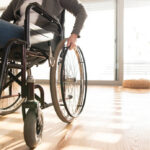Can I Sue If I Find Mold in My Apartment?
Nothing turns your stomach quite like finding unexpected mold in your apartment. The creeping lines of mold up your shower wall, hidden in the back of the closet, or in a damp basement do more than create an unpleasant mildew smell. They can also seriously negatively affect your health.
What do you do after you discover mold in your apartment? Learn more, and if you need help with a landlord dispute, call Reeves & Mestayer at 228-300-2754.
Different Types of Mold
First, recognize that there are many different types of mold that can take hold in your home. The vast majority are harmless, if still ugly and unwelcome. When these types of mold take root, your landlord will likely hire a professional cleaner to get to the base of the problem and eliminate it.
However, black mold is another matter entirely. Black mold can cause significant property damage that cannot be repaired, respiratory issues, nausea, and other health issues. It often lurks in damp, dark places, so you may not discover it until it has already had plenty of time to spread. When this happens, you and your entire family could be in danger.
This requires swift and decisive action to eliminate the problem, take preventative measures so it doesn’t return, and repair any damage that could continue to cause health problems. While this is happening, you and your family may also have to live elsewhere for your own safety.
Your Landlord’s Responsibilities
Your landlord has a legal obligation to provide you a living space that is free of health and safety hazards. In law, this is referred to as an implied warranty of habitability. While most landlords are ethical and try to do what is right for their tenants, there are those who try to sidestep this responsibility. They may claim that this obligation is not spelled out in your lease, so it is your responsibility to get rid of the black mold.
This isn’t true. The obligation to provide a safe and habitable space is a legal one, so it supersedes anything that is or is not written in an individual lease. Black mold is obviously an issue of habitability and safety, so your landlord is required to take care of it promptly.
Legal Action is Not the First Step
Upon discovering black mold in your apartment, your first reaction is likely panic. The realization that you and your family have been breathing in mold particles for an indefinite period of time is frightening, and you may even feel angry. However, do not immediately jump to a lawsuit. While a lawsuit is an option if the issue is not handled promptly and in an appropriate manner, it is typically not the first step.
The first step should be a discussion with your landlord. Get a feel for your landlord’s response. Are they alarmed and do they seem to have a sense of urgency related to fixing it? Do they dispute your claim that it’s black mold, say that it’s just a small problem, or indicate that you may have caused it and may have to fix it?
What to Do if Your Landlord is Uncooperative
If there is anything other than immediate action to make it right and keep you safe, you should reach out to a landlord-tenant dispute attorney. You’re likely going to have issues trying to get your landlord to eradicate the issue instead of just slapping a bandage on it, and you could even be threatened (unlawfully) with eviction for bringing up serious issues.
Your attorney will handle all communication with your landlord, inform them of your rights, and make it known that they are legally obligated to make you whole for any losses you have experienced. If they drag their feet or refuse to handle the situation, you may have to file a personal injury lawsuit against them for any property damage or health issues you have suffered because of the mold.
Let Reeves & Mestayer Help You
Black mold in an apartment is a major issue that can lead to lingering health problems for you and your family. The sooner you reach out to a tenants’ rights attorney, the sooner you can protect yourself. Set up a consultation with Reeves & Mestayer by calling us at 228-300-2754 or contacting us online.







